Outsourcing your IT Services

As your business grows so does your need for effective IT services. To provide your business with the scalability to support growth, you need to be able to address any IT issues that might arise effectively and efficiently. One of the common ways small and medium businesses address this is through IT outsourcing services. IT outsourcing services tend to be more cost-effective than continuing with in-house expertise.
Outsourcing your IT services to providers with experience, technical expertise, and the right management tools, will increase your productivity, reduce costs and improve business growth.
The key to a seamless transition to an IT outsourcing services provider is to evaluate potential vendors in context with your business, your brand, and your team. The sections below will help find a suitable provider best suited for your needs.
On this page:
Five Reasons why Businesses choose IT Outsourcing Services
As a key decision-maker, you’ve probably entertained the idea of outsourcing some aspect of your IT services. The benefits of outsourcing IT services seem apparent, ranging from cutting costs to gaining access to intellectual capital. Here are some of the top reasons why you should consider outsourcing your IT services:
- Reduce and manage operating costs – When outsourcing IT services, you eliminate the costs associated with recruiting an employee, such as management, training, health insurance, taxes, pension or retirement arrangements, and so forth.
- Improve company focus – Most small and medium organizations have limited resources. Outsourcing your IT services allows your business to retain its focus on its core competencies, while another company focuses on your complex technical issues.
- Gain access to expertise, capabilities, and insight – IT outsourcing offers your company the ability to acquire technical knowledge and expertise from experienced professionals who can help to deliver on the technological expectations of your organization. IT outsourcing is a cost-effective strategy because you receive IT support that is consistent with your current hardware and software setup.
- Free internal resources – Most small and medium businesses have someone in your office that is pretty good with IT. In most cases, IT was not the job he or she was recruited for. If they are spending time taking care of IT and technical support issues, who is doing what they were recruited to do? Outsourcing your IT Services allows you to ensure employees are deployed efficiently, where they are most effective and of most benefit to your business.
- Reduce Risk – It can be time-consuming and expensive, trying to keep up with the latest technology required to run your business efficiently and effectively. Since outsourced IT service providers work with multiple customers, they keep up to date on industry best practices, knowing what is right and what is not, and what works and what doesn’t. Such experience and insight significantly reduce your risk of implementing a costly wrong decision.
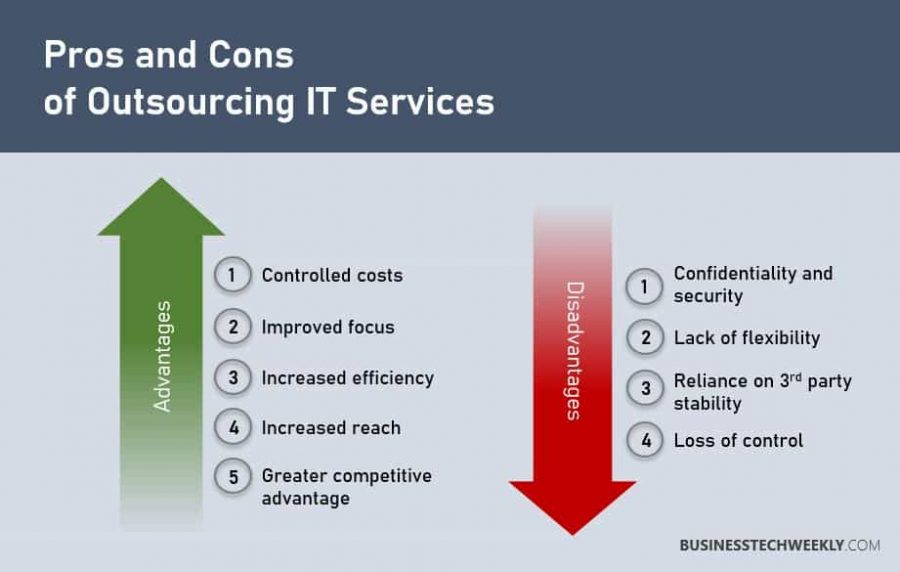
Outsourcing your IT services: Understanding your IT service needs
Before engaging with an IT service outsourcing partner, it is crucial to analyze your IT delivery to understand your business needs and determine what exactly you require IT support outsourcing provider.
The below points should help develop a solid base of understanding of what your organization requires, help to save you much time and supporting a structured process.
- What is the scope of the technical support that you would like to outsource? – You may want to outsource all your IT services, or just an element of it, such as technical support. It is crucial to determine which services you intend to keep in-house, which you intend to outsource.
- Are you looking to decrease costs? – If your organization has outgrown the existing IT team or if you are paying excessively for an existing service, cost savings are likely to be the driver for outsourcing your IT Support. For a comparison to be made, you should identify your current spend on IT-related activities. This figure should include everything from backups, communications, salaries, hardware, to internet connectivity. If IT and technology are taking too much of your, and your senior team’s, time and focus, you may want to quantify this and include this too.
- Identifying your budget – Determining a specific budget will assist in narrowing down your IT support provider selection. Using your current spend on IT delivery you, and allowing for any service improvements, you can identify a budget to be used as a benchmark when in talks with any potential outsourced IT Service provider.
- Are you looking for improved technical support? – If improved IT support is the reason for considering IT services outsourcing, it is worth explaining this to the shortlisted IT Support companies. Detailing your current experience, whether that is from your internal in-house IT team or an incumbent IT Support provider, and what areas of improvement you require. This approach will help both organizations assess if you are the right fit for one another.
- Are you looking to reduce risk? – If you are aiming to reduce risk, that risk needs to be identified first. Once you have identified the risk or risks, you can focus on technical support outsourcing providers with experience of these risks. For instance, if you’re business operations have expanded to, and you require out-of-hours support, you can focus on IT support outsourcing companies which offer 24×7 technical support.
- In which specialist technologies does the new IT Services support provider must be proficient? – If your business relies on specialist applications or hardware, you can focus on technical support outsourcing providers with experience of these technologies, or at least the capability to quickly learn how to work with them.
- What is your industry vertical? – Outsourced technical support providers with direct or indirect experience in your vertical are preferable. They will have a better understanding of your needs, and valuable insight, providing you with an improved overall experience.
- Do they require any certifications to support you? – Industry accreditations provide a level of quality of service. Certifications, such as PCI DSS, Cyber Essentials, or HIPAA, may certify the expertise and knowledge of the technical support outsourcing provider.
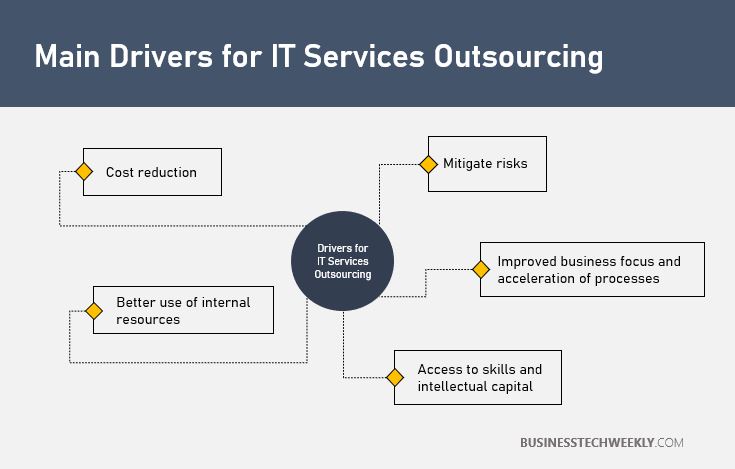
Outsourcing IT Services: Gathering Information
Once requirements have been determined, the next step is to shortlist potential IT support outsourcing partners and engage with them.
While many of the below questions may be answered by looking at the technical support outsourcing provider’s website, it’s always recommended that you get responses directly.
Their responses, to the below questions, will help you determine their experience and knowledge, allowing you to make a like-for-like comparison, and ultimately gauge their suitability.
- Have they supported an organization similar to you before? – If they have experience with supporting a similar company to yours, they are likely to have a good understanding of your needs. They may also be able to provide valuable insight into potential efficiencies and risks that you may have overlooked.
- Do they work with the same or similar technology vendors? – To maximize the chances of a seamless experience, it is advantageous if they already work with the same vendors as you. Working with the same vendors will provide them with an understanding of how your technology stack works.
- Do they have any relevant case studies? – Case studies will provide an insight into the type of projects the outsourcing IT services provider has delivered, allowing you to gauge their understanding of your needs, particularly if they provide a case study relevant to your industry.
- Will you have a specialist/dedicated IT Support Team and Director-led relationships? – Having a dedicated IT support team means you have access to a team of highly accredited engineers and technicians. These will be familiar with your IT needs and able to resolve most issues quickly. Director-led relationships will give you access to a technical leader who truly understands your business, adapting your dedicated IT Support Team according to your business objectives.
- Are they skilled with the technology that you have? – You should ensure your new outsource IT support provider is familiar with the technology you are using to reduce any risk of an incident.
- What is the worst disaster/issue/problem that they have faced with customers in the past 12 months? – This will indicate how resilient the provider is and how they deal with their customers under pressure.
- Are they insured? – Any IT Support provider should have business insurance with a minimum coverage of $1m. While an expensive disaster is a remote likelihood, it could occur and may impact your profits. Requesting to see a company’s business insurance is standard practice.
- Are they certified? – Seek confirmation and evidence of any certifications, and accreditations the company hold, particularly in the technical areas required by your company.
- Do they outsource any services? – Several outsourced IT service providers may outsource services themselves to a different organization. In particular, 24/7 support or outside of normal working hours (09:00 – 17:00) support, can be sometimes outsourced to a specialized company. This could cause a myriad of issues, ranging from under-qualified staff to language issues.
- What are the response times? – Depending on the complexity and severity of the technical issues, response times can vary. However, they should be able to acknowledge a ticket almost instantly. Issues which severe, but not complex, may take up to 2 hours to resolve. Highly complex issues may take up to 16 hours. Try to agree on a system where tickets are prioritized based on agreed definitions in accordance to your needs.
- Are they a Gold, silver, or basic vendor partner? – The higher the vendor level, the better the relationship your provider has with the vendor. For you, this means your outsourced IT provider can offer efficient 3rd party management through fast response times, system updates, new technologies, etc.
- Do they understand PCI DSS and GPDR compliance? – The actions of the outsourced IT service provider may have security implications. They have a responsibility in maintaining the security of your data and systems. Consequently, they must thoroughly be versed in PCI DSS and GDPR compliance.
- In the last five years, what has been their customer retention rate? – Their customer retention rate will indicate how well they adhere to their Service Level Agreements (SLA). While there are several variables outside a SLAs which may cause a company to depart from an outsourced IT support partner, quality and adhering to agreed SLAs is one of the most common ones.
- Do they hold an ISO27001 accreditation? – ISO 27001 provides a framework of policies and procedures that includes all legal, physical and technical controls involved in an organization’s information risk management processes. Ensuring they are ISO 27001 accredited provides a level assurance that their processes and working practices meet this global standard.
- Do they have a knowledge base where IT Support engineers can find solutions to common problems? – Having a knowledge base for reference for known issues and resolution, helps support engineers who may not have worked with your systems or have not previously dealt with that particular issue.
- How many engineers do they have? – You want to ensure they can cope with your demands. In particular, if you have a large user base, you want to ensure that your outsourced IT Support provider has the capability and capacity to handle the demand.
- For what duration have their senior engineers and their management team been with the company? – This could be indicative of a satisfying company culture meaning you are likely to have an overall succesful IT support experience.
- Do their employees receive regular IT professional training? – To ensure your outsourced IT Support is seamless, the IT Support team must be efficient and regularly trained.
- For employees and technical staff, what is the turnover rate? – If they have difficulty in retaining staff, a high staff turnover will reveal this. This will have an implication for your business, in terms of not only the time spent training new staff but also, in the quality of service, they can consistently provide supporting your business.
- For UK businesses, are they a member of the Cyber Security Information Sharing Partnership (CiSP)? – The Cyber Security Information Sharing Partnership (CiSP) exchanges cyber threat information in real-time, in a secure, confidential and dynamic environment, increasing situational awareness and reducing the impact on UK businesses.
- For UK businesses, are they Cyber Essentials accredited? – The Cyber Essentials scheme framework designed to help businesses protect themselves against the most common cyber attacks. A Cyber Essentials accreditation reassures organizations that you have the necessary cybersecurity measures to protect their data. It is recommended that you outsourcing IT services provider is Cyber Essentials accredited.
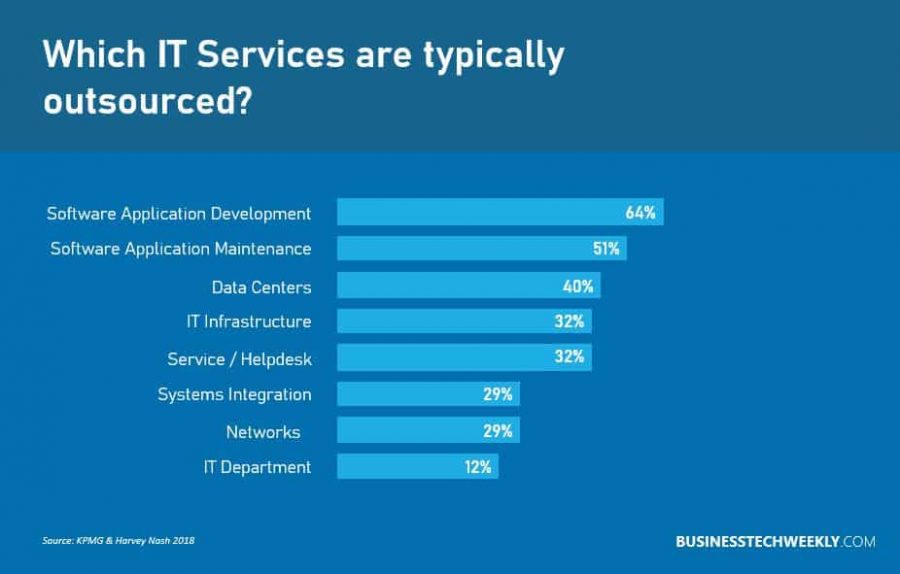
IT Outsourcing Services: Obtaining References
Acquiring customer reviews and references will provide you with an opportunity to understand their customers’ views on how they have helped these businesses achieve their objectives.
Seeing if they have any customer testimonials that they can share with you, particularly if those testimonials are from a business similar to you, will provide you with a better idea of how good the company is.
Speaking with 2 or 3 of their customers will enable you to ask specific questions, which will help you to make the right decision.
Some key questions to ask are:
- How has this outsourcing IT services provider helped you to achieve your business objectives?
This will help determine and ensure that the IT provider has impacted the company positively and support them in achieving their objectives. - Was the onboarding process complex? – This will be indicative of the outsourcing IT support company’s capabilities of dealing with complex onboarding issues and provide you with an insight into potential areas of concern.
- Has your support with them been seamless?
Successfully outsourcing IT Support means a seamless IT Support experience. You will want to identify what issues they faced, how these were overcome, and what steps can be recommended to avoid these issues from occurring. - How long have you been with them, and how has your experience with them been overall?
The duration of the relationship will be indicative of the quality of service they provide.
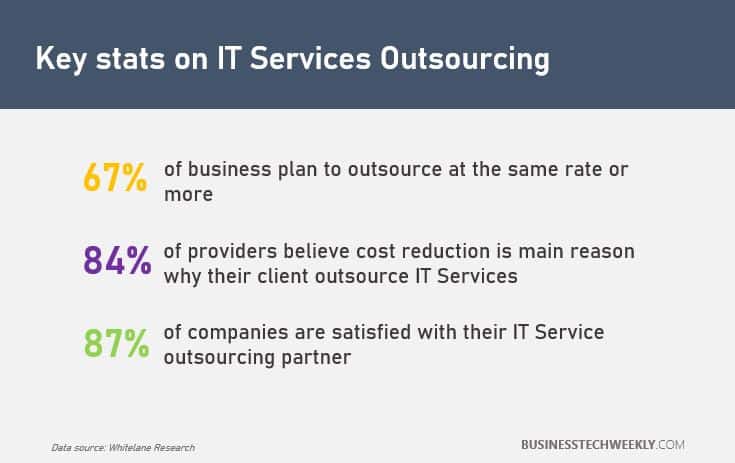
Is Outsourcing your IT Services Right for your Business?
Outsourcing your IT support not only frees up your resources for other aspects of business growth, but it also helps to achieve several goals, leaving you more time to focus on improving the performance of your company internally. Such benefits will be extremely advantageous in tight operating environments.
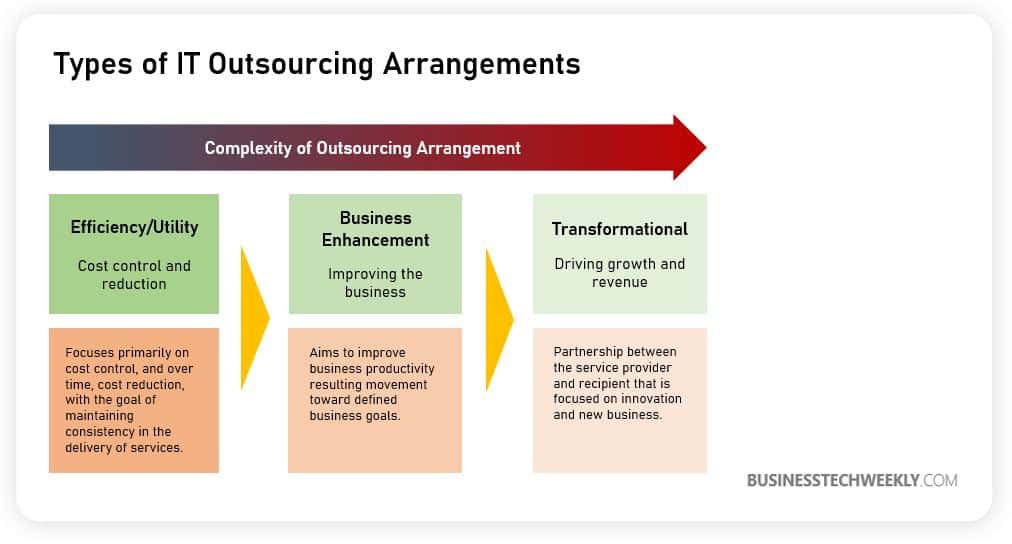
The complexity with outsourcing arrangements can vary from organization to organization. Depending on your requirements, the complexity, and therefore potential issues, may impact the achievement of a seamless transition to an outsourcing IT services provider.

